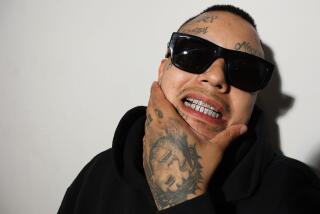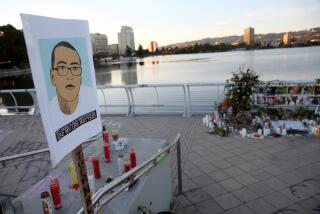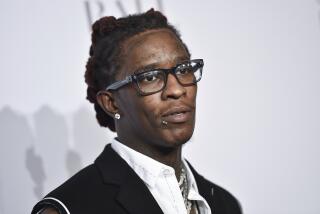Investigation of rapper’s slaying comes up empty
Nine months after rap star Notorious B.I.G. was shot to death in the mid-Wilshire district of Los Angeles, the investigation into his slaying appears to have ground to a halt.
Los Angeles homicide detectives say they have been hampered in their efforts to prosecute the case because of a lack of cooperation by witnesses to the March 9 shooting of the 24-year-old Brooklyn rapper, whose real name was Christopher Wallace.
But Wallace’s family and friends are growing increasingly frustrated and say that authorities have bungled the case. They say investigators have failed to interview key people connected to the slain rapper, including a New York figure known as Zip, who allegedly introduced Wallace to members of the Compton street gang that law enforcement sources believe may have been responsible for his death.
“I’m sick to my stomach over the way this case has been handled,” Voletta Wallace, the slain rapper’s mother, said Monday in a phone interview from her home in New Jersey. “There is a murderer out there laughing at my family and laughing at the cops. And it makes me furious. I’ve held my tongue for months now, but I’m fed up with the police just pussyfooting around. I really am beginning to believe what others tell me: that the police don’t care about solving the murders of young black men--especially rappers.”
Los Angeles Police Det. Russell Poole, the lead investigator in the case, disagreed. Poole said detectives have interviewed more than 200 witnesses since March and continue to chase leads on a daily basis.
“We are trying to do everything in our power to solve this murder. It is our top priority,” Poole said. “I understand that Mrs. Wallace is upset, but I’ve tried to explain to her that you can’t just throw a case like this together. You need eyewitnesses--and we have none. We’ve interviewed hundreds of witnesses, and the majority of them are not being totally candid with us. It’s very frustrating.”
Poole refused to discuss details of the probe, but law enforcement sources say the investigation is still focusing on the likelihood that the rapper was gunned down over a financial dispute with a member of the Southside Crips--possibly the result of an unpaid security bill. The same Compton gang is believed to be connected to the Las Vegas slaying of rapper Tupac Shakur six months earlier.
The two cases illustrate the difficulty that investigators face in solving many gang-related shootings, in which fearful witnesses and lack of evidence often hamper police efforts. The unsolved slayings also underscore the wide gulf between the police and potential witnesses.
Shakur’s family and friends have repeatedly complained that Las Vegas police botched the investigation of his slaying by harassing key witnesses.
Wallace’s wife, singer Faith Evans, and others close to Wallace say they are reluctant to try to help detectives because LAPD investigators have treated them like suspects during past interviews--an allegation Poole adamantly denies. One witness also discredited the police’s composite sketch of the murder suspect, contending that the LAPD added details to the drawing that he and others never suggested.
The criticisms in the Wallace case come at a time when new information has surfaced about the rapper’s movements during the last days of his life--and his association with Zip, a Harlem resident who sources say spends about a month each year in the Compton area.
Sources say Zip, whose real name is unknown to police, is the godfather of Wallace’s child and knew the rapper well, visiting him and his record company chairman, Sean “Puffy” Combs, frequently at recording studios and video locations in New York and Los Angeles during the year before the shooting.
Sources who have not yet talked to the police told The Times that Zip drove Wallace and his friends into the Compton area about a week before the slaying. The rapper signed autographs for a group of strangers in front of a house that Zip located in a neighborhood affiliated with the Southside Crips, sources said.
Sources say that on March 8, the night before the shooting, a dark Chevy Impala matching the description of the car used by Wallace’s killer was part of a 10-car caravan of Crips gang members traveling down Sunset Boulevard with a sports-utility vehicle carrying Wallace. Those sources suggest that the rapper knew the man who shot him.
That same evening, Zip, driving a black bulletproof Mercedes 500, was seen talking to both Wallace and the driver of the dark Impala.
Wallace was gunned down just after midnight March 9 in front of hundreds of people who had just left a music industry party at the Petersen Automotive Museum at the intersection of Fairfax Avenue and Wilshire Boulevard. Wallace was sitting in the passenger seat of a sports-utility vehicle at a red light when a lone assassin in a dark Impala pulled up in the next lane and opened fire.
Poole says Zip is not a suspect in the case, but that investigators would like to interview him.
“We know who Zip is, and we want to ask him some questions,” Poole said. “But so far, we have not been able to contact him. He does not stay in one place for very long. And the people who know him will not give us a number where he can be reached.”
Sources say that Zip is an associate of Dwayne Keith “Keefee D” Davis, the Compton resident whose Chevy Impala was seized seven months ago by investigators in connection with the case. Davis, who law enforcement sources say is listed in police files as a member of the Southside Crips, was interviewed in June by investigators, who told him that he is not a suspect in Wallace’s slaying.
During his interview with police, Davis told investigators that Zip had introduced him to Wallace nearly two years before the rapper was slain, sources said. Zip brought Davis to a hotel room in Anaheim and told the rapper that Davis knew people who could provide protection in Los Angeles for Wallace’s entourage should he ever need it, sources said.
Sources say that about two dozen members of the Southside Crips accompanied Davis and Zip during their meeting with Wallace that night, including Davis’ nephew Orlando Anderson, a Lakewood resident who was named recently as Shakur’s killer in a lawsuit filed by Shakur’s mother.
Anderson has repeatedly denied having anything to do with Shakur’s death and also denies being a gang member. On Monday, his attorney Renee Campbell said Anderson was not present at the Anaheim hotel meeting and knew nothing about it.
Law enforcement sources contend that Wallace and Combs regularly used members of the Southside Crips for security when visiting Los Angeles. Combs has adamantly denied hiring gang members as security, maintaining that his company only employed off-duty California and New York police officers for protection.
One source this week said Wallace was killed because he and his representatives refused to pay a $100,000 security bill to the Crips. Voletta Wallace said her son received a flurry of death threats during the last months of his life.
In the weeks before Wallace was killed, he and his entourage were under surveillance in Los Angeles as part of a federal investigation of criminals allegedly affiliated with the rapper’s label, Bad Boy Entertainment, sources said.
“The government invested a lot of time and money into following my son, hoping to catch him doing something wrong before he was shot down,” Voletta Wallace said. “I wish they were half that enthusiastic about trying to find the guy who took his life. It certainly didn’t take this long to catch [fashion designer Gianni] Versace’s killer or the guys behind the Oklahoma or the World Trade Center bombing, did it? Are the lives lost in those tragedies more important than my son’s?”
More to Read
Start your day right
Sign up for Essential California for news, features and recommendations from the L.A. Times and beyond in your inbox six days a week.
You may occasionally receive promotional content from the Los Angeles Times.






